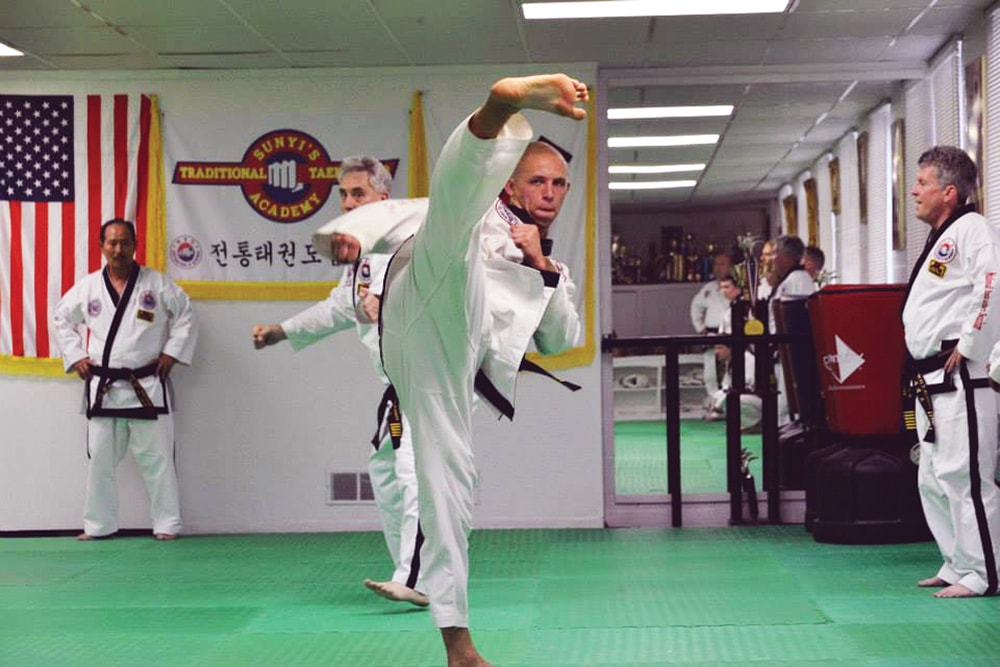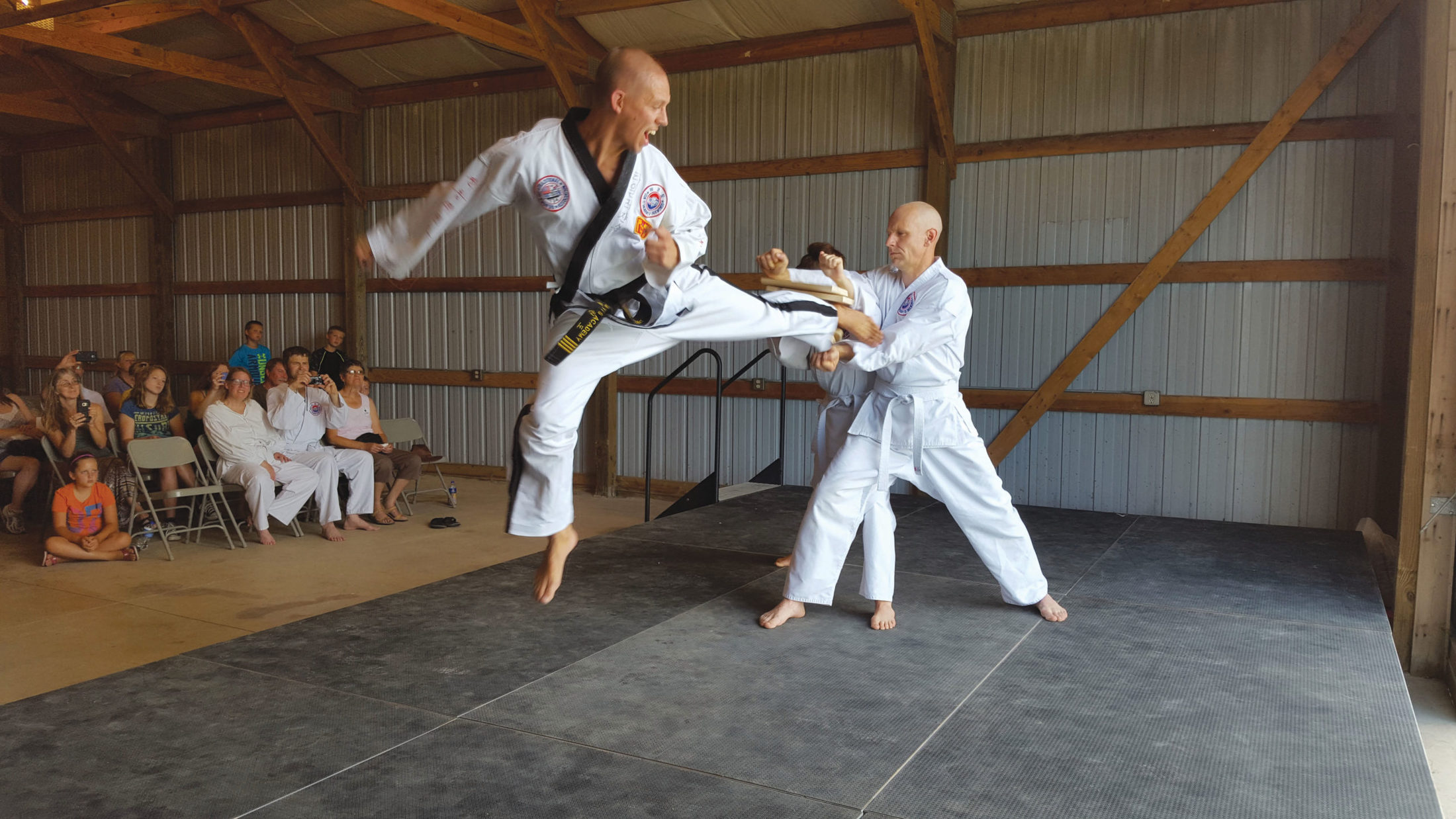What Tae Kwon Do Can Teach us About Discipleship
One day last December, I stood on the edge of the workout floor of the national headquarters of Sun Yi Academy. Twenty feet in front of me, three youth formed an obstacle three-and-a-half-feet tall and six-feet long with their crouching bodies. Beyond them, two adults held the pieces of one-inch pine that were my target.
This was the final requirement to earn my fifth Dan master instructor rank in traditional Tae Kwon Do. I had spent the morning demonstrating the skills and techniques I had been learning for the past 16 years. Now, all I had left to do was leap over the obstacle and kick through the boards. I took a deep breath, focused, and started my approach.
Traditional Tae Kwon Do is a Korean martial art that seeks to unify the body and mind. It focuses on teaching unarmed self-defense through strikes, kicks, and grappling techniques. But just as important, it teaches virtues such as courtesy, integrity, and self-control.
I started practicing Tae Kwon Do in college after a friend convinced me it would be a good way to earn a physical education credit. I was hooked instantly as I watched black belts who could destroy four inches of pine with a single kick stop their kicks within an inch of their opponent’s face without actually hitting them. I saw men and women who exemplified skills and characteristics that I wanted for myself, and a path toward developing them. In short, I found a discipleship program.
Don’t get me wrong. Tae Kwon Do is not a Christian discipleship program. Its goal is not to train practitioners to embody the character of Christ. Its goals are self-defense and better mind-body connection. But I believe the practice is effective at raising up disciples and empowering them to make more disciples. The church, however, is meant to be a Christian discipleship program—a place where spiritually uncoordinated and morally clumsy people can find exemplars that can lead them into a better self-God connection.
I am both a pastor and a master of traditional Tae Kwon Do. (I get the rare rhythmic appellation of “master pastor”!) Disciple-making is an expectation that comes with both of these titles, so I have spent some time considering what wisdom I can cull from Tae Kwon Do that might be helpful in our Christian calling to make disciples.
Wherever we find ourselves in this time of pandemic, one thing is sure: our illusion of control has been exposed. – Mathein Pathein
“Son though he was, he learned obedience from what he suffered” (Hebrews 5:8).
I teach my Tae Kwon Do students an ancient Greek aphorism: mathein pathein, or “To learn is to suffer.” There is no getting around it. If you are going to learn everything you need to achieve a black belt or higher in Tae Kwon Do, pain will be part of the journey. New students experience sore hips, legs, and backs as muscles are developed and loosened to accommodate the new movements their bodies are learning to perform.
Through practice and stretching, a student’s body can often adapt to most of the new techniques within a year, transforming fumbling white belts into strong, capable, confident practitioners. The pain yields greater flexibility and better mobility and paves the way for techniques to become more powerful and more
controlled.
I discovered mathein pathein when I was in seminary studying the book of Hebrews. Translating the complicated Greek of Hebrews is a great example of learning through suffering, but it’s also interesting to note that the author of Hebrews applies this popular Greek idea to Jesus. In Hebrews 5:8 the writer says that Jesus, even though he was God’s Son, learned obedience from what he suffered. We see this most clearly in the Garden of Gethsemane where, facing death, Jesus learned deeply what it meant to be tempted to follow a will other than his Father’s. He perfectly submitted his will to God’s even though doing so was painful.
Being a disciple means submitting our will to the will of God. It is a call to take up our cross and to die daily as we follow Jesus. To be a disciple is to suffer. It is hard. Our word disciple comes from a Greek word that means learner.
The global coronavirus pandemic and the quarantine that has accompanied it brings this reality home. Whether you have been isolated from virtually all human contact or, like me, are confined in an ever-shrinking house with four kids, the COVID-19 virus is disruptive. Maybe you are on the front line of combating this contagion. Maybe you’ve lost your job. Maybe you are fighting illness. Maybe you’ve lost loved ones. Wherever we find ourselves in this time of pandemic, one thing is sure: our illusion of control has been exposed, and many of our coping mechanisms are denied. What do we do when we can’t ease our discomfort?
Perhaps this becomes an opportunity to learn obedience through suffering. We can acknowledge the ways we have made idols out of comfort and convenience. We can recognize how frequently we use our financial resources to feel in control of our world. We can allow ourselves to see how much of our former busyness was really just chasing after the wind. And we can remember God’s call to patience and self-control. We can learn new levels of grace toward those we are quarantined with, new ways of loving our neighbors who we are distancing from, and new depths of trust in the God who will never leave us or forsake us.

Muscle Memory
“But solid food is for the mature, who by constant use have trained themselves to distinguish good from evil” (Hebrews 5:14).
Every Tae Kwon Do class begins with the basics. No matter your rank, from the student who just signed up that day, to the junior grandmaster who has been practicing for 40 years, everyone starts class in a wide stance, knees bent, punching the air in front of them. The exercises and practices that follow develop flexibility, power, and control.
Our classes are rote. They are repetitive. A majority of the class is spent practicing strikes and kicks without hitting our opponent. We learn how to control our bodies. We train our muscles not to make contact. In many ways we are practicing nonviolence even as we are learning self-defense. Over time a student trains his or her muscles to stop before making contact so that it takes intention to actually strike someone, be it a sparring partner or someone trying to do you harm.
Similarly, the life of a disciple includes daily repetition of basic practices. To be conformed to the image of Jesus, we are called to train ourselves to react in a new way. When we’d rather hold a grudge, Jesus says forgive. When we’d rather vent on social media, Jesus says talk directly. When we’d rather divide the world into good people and evil people, Jesus says love your enemies and pray for those who persecute you. Following these commands does not come naturally to us. Our spiritual muscles are already trained toward selfishness, pride, gossip, slander, and envy. They must be retrained. It is not easy.
So we find time daily to stand, sit, or kneel before God in prayer. We practice moments of self-reflection and listening to the Spirit. We confess our sins and accept forgiveness. We actually pray forgiveness for our enemies. We spend time regularly reading God’s word and allowing it to expose our pride and selfishness and remember that we are loved and forgiven. It takes intentionality and
practice to develop the spiritual muscle memory that makes forgiveness and repentance our automatic responses, but this is our call.
In Tae Kwon Do we practice self-defense so that in a time of crisis we are able to protect ourselves and help others without losing control or integrity. Our spiritual disciplines can also help prepare us for crisis. When the world seems to be falling apart around us, a habit of dependence on God can bring peace to the chaos. When the news is filled with anxiety and fear, a habit of thanksgiving can lift our sight above the fray. When politicians and leaders contradict each other and argue over truth, a habit of reading God’s word can remind us who is really telling the story.
We have an understandable reaction against hierarchy in the church these days – we have heard too many stories of abuses of power. – The Power of a Mentor
“Follow my example, as I follow the example of Christ”
(1 Corinthians 11:1).
Like most martial arts programs, Tae Kwon Do uses a belt system to designate rank. New students are white belts. They are beginners, newbies. They learn the most basic of the basics.
Over time they have the opportunity to test for the next rank, which involves demonstrating what they have learned so far. If they successfully pass their test, they move to the next belt level: low orange.
A dedicated and diligent student can work their way through the nine belt levels before achieving a black belt in about two years. There are also nine levels of black belt. It takes a dedicated and diligent black belt at least another 13 years to hit the midway point of fifth-degree black belt.
The beauty of the belt system is that it immediately identifies where students fall within that hierarchy. This means every student can see who in their class may be able to answer their questions, who they can look to as an example, and who they can disciple. No matter what your rank, every participant in Tae Kwon Do is expected to be an example for lower-ranking students. Once you earn your black belt, this role becomes more formal and you are expected to help teach lower ranks the art you are learning.
We have an understandable reaction against hierarchy in the church these days—we have heard too many stories of abuses of power. But the truth is, we are all at different places in our spiritual journeys, and we all need guides to show us our next steps. We must have mentors to look up to, people who spur us on to love and good deeds. We need exemplars who demonstrate Christlike living. And we must realize that we are always living examples of Christ’s character for others.
There comes a point in Tae Kwon Do when physical skills are no longer the most important aspect of your rank. The most senior masters are not necessarily the most powerful people in the room. They are the ones who have faithfully embodied and passed along the tenets that traditional Tae Kwon Do is built upon. Spiritual maturity should also not be confused with power. If Christ is our example, then wisdom, humility, and servanthood should characterize our spiritual giants. These are people who embody grace and peace even in the midst of a pandemic, people whose mirth and winsomeness remind us to rejoice in God’s goodness and faithfulness even in times of anxiety and chaos.
Challenges will come in this life. Whether it is jumping over three people and kicking through pine boards or enduring the anxiety and threat of COVID-19, we cannot avoid the difficulties this world offers. The practices of Tae Kwon Do provide me the skills necessary to face the battery of tests required to earn my master rank. And spiritual practices, faithfully exercised every day, enable us to shine with the light of God’s love, grace, and joy even in the face of a global pandemic.














